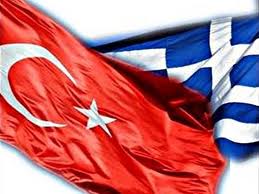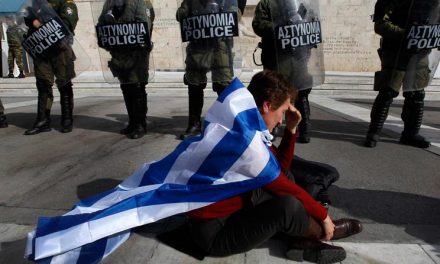An unwanted incident in the Aegean could easily escalate into a military confrontation.
By: Thomas Seibert, The Arab Weekly
Tensions are rising between NATO allies Turkey and Greece over territorial claims in the Aegean at a time when Turkish efforts to prevent gas exploration in the eastern Mediterranean are causing alarm, prompting Europe to chide Ankara for violating “good neighbourly relations.”
Greece says Turkish fighter jets were responsible for nearly 2,000 airspace violations, mostly over the Aegean, last year. Some Greek islands are just a few kilometres from the Turkish mainland and border demarcations are not always clear.
The area is the scene of frequent dogfights between Turkish and Greek jets. In February, a Turkish Coast Guard ship rammed a Greek Coast Guard vessel in disputed Aegean waters. Turkish President Recep Tayyip Erdogan angered Athens in December when he suggested that a 1923 treaty that gave most Aegean islands to Greece should be looked at again.
The arrest of two Greek soldiers who strayed onto Turkish territory on the land border between the two countries in March is another irritant because Ankara refused to return the soldiers to Greece. Turkish officials have sharply criticised authorities in Athens for refusing to extradite Turkish soldiers accused by Ankara of involvement in a coup attempt against Erdogan in 2016.
Greek Prime Minister Alexis Tsipras used a visit to the island of Kastellorizo — close to the southern Turkish coast — on April 17 to warn Turkey that his country would not negotiate over its territory.
“Many times we find ourselves, it is true, in troubled times, faced with the unjustifiable behaviour, a provocative stance and an aggressive stance by our neighbours,” Tsipras said. “These days we are experiencing one such period of instability, which is not in line with the principles of good neighbourliness or with the rules of international law.”
Greek news reports said Turkish fighter jets harassed the helicopter carrying Tsipras and Greece’s military chief Evangelos Apostolakis after the visit to Kastellorizo.
Turkey also sent navy vessels to disturb gas exploration around the divided island of Cyprus, arguing the search for natural resources under the sea violated the rights of Turkish Cypriots. Hulusi Akar, Turkey’s chief of general staff, said Turkey would “not allow a fait accompli in the Aegean and the eastern Mediterranean.” Turkey complained of provocation by Greece after a Greek flag was hoisted on an uninhabited island in a disputed part of the Aegean.
Turkish-Greek antipathy has deep roots. In Greece, the revolution to shake off Ottoman rule in the 19th century is seen a central part of the country’s history. On the other side of the Aegean, a Greek attempt to occupy parts of western Anatolia as the Ottoman Empire crumbled after the first world war is deeply ingrained into Turkey’s collective memory.
Today’s tensions tap into that history. Gonul Tol, director of Turkish Studies at the Middle East Centre in Washington, said domestic considerations are behind the rhetoric from Ankara.
“Erdogan is playing the nationalist card, which is now the main driver behind Turkey’s foreign policy,” Tol said in an interview. Turkey is having local, parliamentary and presidential elections in the next few months. Polls indicate Erdogan cannot be certain of winning a majority in parliament or of re-election as head of state.
Critics say electoral calculations were also one of the reasons for the recent Turkish incursion into the northern Syrian region of Afrin. Tol argued that Erdogan has turned to a hawkish foreign policy because of rising economic woes and a lack of enthusiasm among young voters for Erdogan’s ruling Justice and Development Party. “He is conducting a more nationalist foreign policy because that is the one thing that unites everyone,” Tol said.
That political game is not without risk. An unwanted incident in the Aegean could easily escalate into a military confrontation. In 1996, the two NATO allies almost went to war against each other over a small island in the Aegean. French President Emmanuel Macron has said France would defend Greece if it was threatened by Turkey. Tol said both Greece and Turkey were determined to “contain the crisis” despite their rhetoric.
The increasing animosity between Ankara and EU members Greece and Cyprus places a further burden on Turkish-European relations. In a report marked by sharp criticism of Turkey’s growing authoritarianism, the European Commission blasted Ankara for tensions in the Aegean and in the eastern Mediterranean that “were not conducive to good neighbourly relations and undermined regional stability and security.”
The report was part of a regular evaluation of Turkey as an applicant for EU membership. Negotiations began in 2005 but progress has been slow. EU officials say a deterioration of the rule of law in Turkey means that further talks about bringing Turkey’s laws into line with those of the European Union make no sense for the time being. Relations have been tense since Erdogan’s crackdown on dissent following the coup attempt of 2016.
“Bilateral relations with several EU member states deteriorated, including at times offensive and unacceptable rhetoric,” the EU report said. “Turkey needs to commit itself unequivocally to good neighbourly relations.”
Ankara dismissed the criticism, saying Brussels was “far from understanding the realities of Turkey.” The Turkish Foreign Ministry warned the European Union against giving “carte blanche” to its members, such as Greece, saying such a stance “contradicts the European Union’s own values.”



















